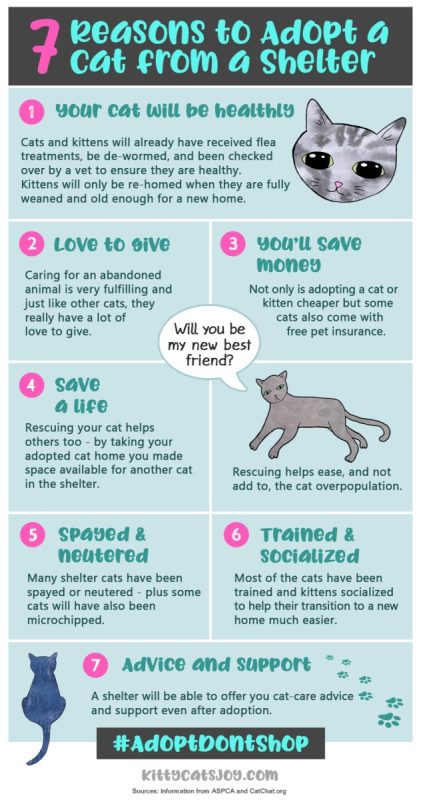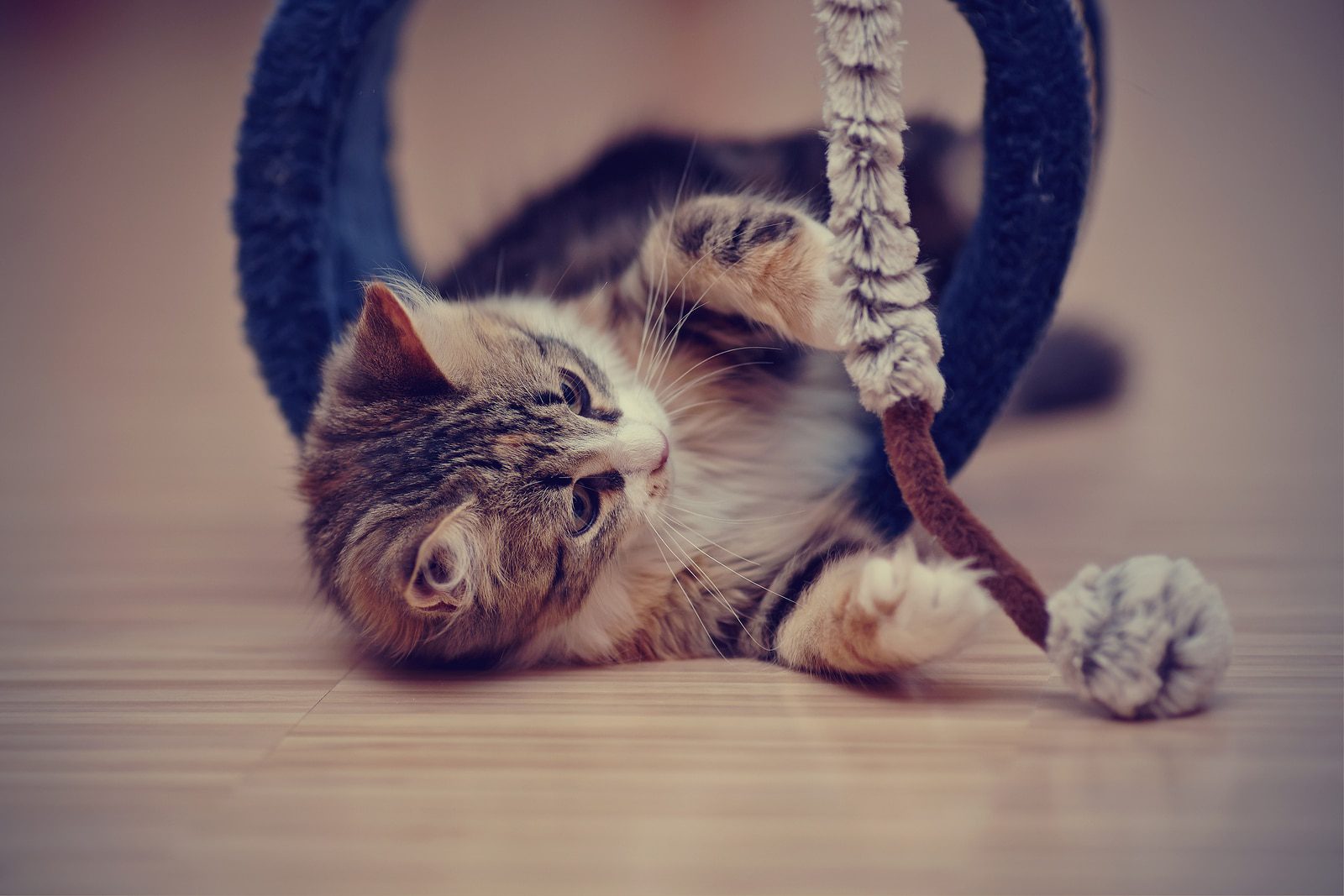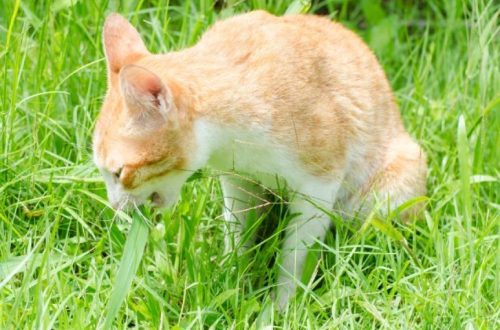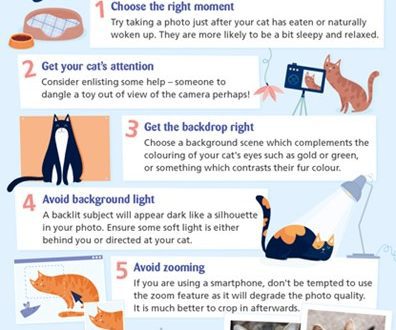
What you need to know when you adopt a cat from a shelter
If you decide to get a cat, it is better to adopt one from a shelter than to buy one from a pet store or breeder. First of all, it’s cheaper. In some shelters, pets are vet checked, vaccinated and neutered before being offered to a new owner. Many organizations evaluate a cat’s characteristics, such as its temperament, and can help you find the right animal for your home, personality, and lifestyle. In shelters, as a rule, there are cats with a wide variety of characteristics: young and old, long-haired and short-haired, of various colors and temperaments. Many establishments also offer purebred cats. With such a variety in the cat shelter, you can just get confused. We offer several recommendations on how to choose the most suitable cat.
Contents
Consider your lifestyle
 Before adopting a cat, it’s a good idea to decide what characteristics your new pet should have. To do this, you need to analyze your own lifestyle and character. Do you work all day, travel a lot and often attend various events in the evenings? If this applies to you, you should choose an independent cat that is not prone to anxiety. A cute kitten will feel lonely if his owner is absent all the time.
Before adopting a cat, it’s a good idea to decide what characteristics your new pet should have. To do this, you need to analyze your own lifestyle and character. Do you work all day, travel a lot and often attend various events in the evenings? If this applies to you, you should choose an independent cat that is not prone to anxiety. A cute kitten will feel lonely if his owner is absent all the time.
Homebodies are best suited for a very affectionate or very energetic cat. People with a lot of free time and a lot of patience can handle an eccentric kitten that will run around the house, hunt for toys and attack your fingers. If you’re looking for a fluffy beauty to share the couch with at the end of a long day, consider a calm and loving cat.
Consider the composition of your family. If you have small children or other pets, choose a good-natured, friendly cat that is well socialized and gets along well with people and other animals. It may be best to adopt an adult cat, unless you have the opportunity to constantly look after the pet. While kittens are absolute cuties, they can be easily hurt, especially by ubiquitous baby hands or impatient adult animals.
What characteristics of a cat should be paid attention to
If you have already made the decision to adopt a cat, pay attention to the following important points:
- Kitten or adult cat? It’s hard to resist the temptation to adopt a kitten, and perhaps one of them has already sunk into your heart. Just remember that kittens are very energetic and require a lot of time and patience. A kitten’s temperament can be difficult to predict because it changes as it matures. If you prefer animals with a certain temperament, then it is better to take an adult cat. They tend to be quieter, litter box trained, socialized and house-adapted. It should also be taken into account that kittens grow up much faster than children. Most of them turn into adult cats by the end of the first year of life.
- Temperament and character. Do you like friendly and outgoing cats or those that prefer to keep to themselves? Will your cat have to get along with children and other pets, or will she be the only one? Do you want your cat to be energetic and playful or calm and couch potato? Do you prefer talkative or silent cats? These characteristics have more to do with how happy you will be with your new kitten than the characteristics of their appearance, so it is important to decide on your preferences before visiting a shelter. Fortunately, shelters allow and even offer to interact with the cat before you adopt it, in a specially designed room for this. This will allow you to better know her temperament. If the cat is open and likes to play with toys, she is probably very sociable. If she hides in a corner, she may need time to get used to you. If a cat is very friendly, purrs and allows you to stroke it, it may be the cutest creature.
- Longhair vs shorthair. Long-haired cats are beautiful, but require careful care. If you don’t have time to brush your fluffy beauty regularly, you’re better off getting a short-haired cat. In addition, matted hairballs are more likely to form in long-haired ones. Get ready for it!
- Color. Regardless of coat length, cats shed. If your living room is decorated in perfectly white or light colors, a dark-colored cat may not suit you. Similarly, if you prefer black and navy blue and love to cuddle with a cat, you may not want to get a white or light-colored cat.
- Breed.
 Purebred cats, such as Siamese, have certain characteristics that are characteristic of their breed. For example, you can be sure that the Siamese will make a lot of loud noises and the Maine Coon will be friendly and affectionate. Before visiting the shelter, it would be a good idea to learn about the different breeds of cats and their temperament. Remember that most cats are categorized as normal mixed breed domestic cats. This category includes animals of a certain color: striped, “tuxedo”, tricolor and tortoiseshell, which can be either short-haired or long-haired. Their temperament can vary greatly. Any two cats that are the same on the outside can have completely different personalities. One advantage of mixed breed cats is that due to their diverse gene pool, they are less prone to genetic diseases than purebreds, say veterinarians.
Purebred cats, such as Siamese, have certain characteristics that are characteristic of their breed. For example, you can be sure that the Siamese will make a lot of loud noises and the Maine Coon will be friendly and affectionate. Before visiting the shelter, it would be a good idea to learn about the different breeds of cats and their temperament. Remember that most cats are categorized as normal mixed breed domestic cats. This category includes animals of a certain color: striped, “tuxedo”, tricolor and tortoiseshell, which can be either short-haired or long-haired. Their temperament can vary greatly. Any two cats that are the same on the outside can have completely different personalities. One advantage of mixed breed cats is that due to their diverse gene pool, they are less prone to genetic diseases than purebreds, say veterinarians. - Special care. Cats requiring special care include pets with diseases common to aging, blind, deaf and disabled cats, as well as animals with chronic diseases. Even if your heart melts when you see one of these specialty cats at the shelter, don’t forget that she will take more time and attention from you, she will need regular veterinary care and treatment, which can be expensive. Before you take on this challenge, be honest with yourself about whether you have the spare time and extra money to provide special care for such a cat.
Choosing your cat
Many shelters have consultants to help select animals. If a shelter advisor is not available, you can talk to staff and volunteers who spend a lot of time with cats and are familiar with their personalities. On your own, it will be difficult to determine the true temperament of a cat at the first meeting in a shelter, because it may be stressful for her, and she will behave differently than usual.
In general, Vetstreet advises that if you have children or other pets, choose a bold, friendly cat that runs towards you to greet you as soon as you enter the room, purrs happily and rubs its muzzle against your hand. Cats that have adapted to the environment at the shelter and get along well with other animals are more likely to make friends with your pets. Conversely, if you have peace and quiet in your home, you may be better off choosing a modest, shy cat who will become calmer and friendlier after living in your home.
By adopting a cat from a shelter, you will be rewarded. It’s not just about the joys of caring for a new pet, it’s about the fact that you save a cat, and there will be an empty place in the shelter for another cat in need of help. By following our recommendations, you will find the perfect kitten for you.



 Purebred cats, such as Siamese, have certain characteristics that are characteristic of their breed. For example, you can be sure that the Siamese will make a lot of loud noises and the Maine Coon will be friendly and affectionate. Before visiting the shelter, it would be a good idea to learn about the different breeds of cats and their temperament. Remember that most cats are categorized as normal mixed breed domestic cats. This category includes animals of a certain color: striped, “tuxedo”, tricolor and tortoiseshell, which can be either short-haired or long-haired. Their temperament can vary greatly. Any two cats that are the same on the outside can have completely different personalities. One advantage of mixed breed cats is that due to their diverse gene pool, they are less prone to genetic diseases than purebreds, say veterinarians.
Purebred cats, such as Siamese, have certain characteristics that are characteristic of their breed. For example, you can be sure that the Siamese will make a lot of loud noises and the Maine Coon will be friendly and affectionate. Before visiting the shelter, it would be a good idea to learn about the different breeds of cats and their temperament. Remember that most cats are categorized as normal mixed breed domestic cats. This category includes animals of a certain color: striped, “tuxedo”, tricolor and tortoiseshell, which can be either short-haired or long-haired. Their temperament can vary greatly. Any two cats that are the same on the outside can have completely different personalities. One advantage of mixed breed cats is that due to their diverse gene pool, they are less prone to genetic diseases than purebreds, say veterinarians.

